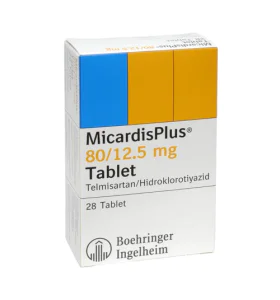


Mix of two substances: Telmisartan, an antihypertensive agent, shows potential in cancer therapy by inhibiting esophageal squamous cell carcinoma growth. It promotes cell-cycle arrest in the S-phase by targeting proteins like cyclin A2 and CDK2 and affects ErbB3 receptors, marking its promise beyond hypertension management. In transplant recipients, hydrochlorothiazide (HCTZ) is linked to a two-fold higher risk of squamous cell carcinoma (SCC) due to its photosensitizing properties. The drug’s impact on basal cell carcinoma (BCC) is negligible, but SCC’s aggressive nature highlights the importance of sun protection and regular skin checks for these patients.
Matsui, T., Chiyo, T., Kobara, H., Fujihara, S., Fujita, K., Namima, D., Nakahara, M., Kobayashi, N., Nishiyama, N., Yachida, T., Morishita, A., Iwama, H., and Masaki, T. (2019) Telmisartan inhibits cell proliferation and tumor growth of esophageal squamous cell carcinoma by inducing S-phase arrest in vitro and in vivo', International Journal of Molecular Sciences.
Letellier, T., Leborgne, F., Kerleau, C., Gaultier, A., Dantal, J., & Ville, S., on behalf of the Divat Consortium. (2020) 'Association between Use of Hydrochlorothiazide and Risk of Keratinocyte Cancers in Kidney Transplant Recipients', Clinical Journal of the American Society of Nephrology.
Disclaimer: Information provided it this page is for general information only and does not substitute for professional medical advice.
For detailed information about Micardis Plus 92.5 by Boehringer Ingelheim, consult with your doctor or healthcare professional.


Letellier, T., Leborgne, F., Kerleau, C., Gaultier, A., Dantal, J., & Ville, S., on behalf of the Divat Consortium. (2020) 'Association between Use of Hydrochlorothiazide and Risk of Keratinocyte Cancers in Kidney Transplant Recipients', Clinical Journal of the American Society of Nephrology.

Letellier, T., Leborgne, F., Kerleau, C., Gaultier, A., Dantal, J., & Ville, S., on behalf of the Divat Consortium. (2020) 'Association between Use of Hydrochlorothiazide and Risk of Keratinocyte Cancers in Kidney Transplant Recipients', Clinical Journal of the American Society of Nephrology.

Matsui, T., Chiyo, T., Kobara, H., Fujihara, S., Fujita, K., Namima, D., Nakahara, M., Kobayashi, N., Nishiyama, N., Yachida, T., Morishita, A., Iwama, H., and Masaki, T. (2019) Telmisartan inhibits cell proliferation and tumor growth of esophageal squamous cell carcinoma by inducing S-phase arrest in vitro and in vivo', International Journal of Molecular Sciences.